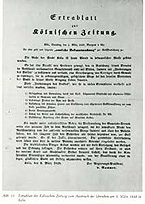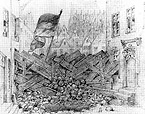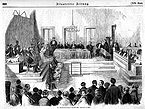Schrift: größer/kleiner
Inhaltsverzeichnis
Sie sind hier: WirRheinländer > english version > The Revolution of 1848 > Dates
The 48 Revolution
Dates
1848
February revolution in France: King Louis Philippe flees after an uprising in Paris. France becomes a republic. (23rd -24th Feb.)
"March demands": In south-west Germany citizens demand jury courts, a people's militia, freedom of assembly and freedom of the press. (from 27th Feb.)
Unrest in the Rhine Province: After riots the "Cologne Petition" issues new challenges to Prussia's Government. (3rd Mar.)

Of all the provinces in Prussia, revolutionary unrest first seizes the Rhineland, before it quickly spreads to Berlin. At the beginning of March 1848, a meeting of over 5,000 people in Cologne, which is finally dispersed by the military, goes far beyond the hitherto usual catalogue of demands by liberals and moderate conservatives – a written constitution, a parliament elected by free, equal, direct and secret ballot, equal rights for all state citizens, freedom of association and of the press. Definitively guided by the communist doctor, Andreas Gottschalk (1815-1849), the participants demand in their "Cologne Petition" legislation and administration by the people and their revolutionary committees, job security (i.e. safe from unemployment) and social security to cover basic human needs: this radical program, which aims at a kind of soviet republic and a socialist welfare state, is intended to bundle the protests of workers and tradesmen in Aachen, Trier, Elberfeld, Düsseldorf, Solingen and Krefeld against factory work, mechanization and low wages, together with the displeasure of carters and boatmen at railways and steamships. At the same time some people refuse to pay taxes, while others steal timber from the woodlands.

The signatories do not achieve a resounding success, because the majority of some pro-fessions, e.g. the textile workers of Bergisch Land and the Lower Rhine, remain largely passive and within a few days the main focus of political development in Prussia shifts from the Rhine to the Spree. None the less, the Petenten from Cologne have given the revolutionary process a resonance of effective publicity and a psychologically meaningful dynamic, which accelerates the understanding in Berlin for the necessity of reforms.
Concessions by the King: After riots in Berlin Friedrich Wilhelm lV. promises a constitutional agreement and to merge Prussia into a national state. (18th -21st Mar.)
"March Ministry": The King appoints two Rhenish Liberals as Ministers. (29th Mar.)
Both the new ministers, David Hansemann and Gottfried Ludolf Camphausen, ranked among the most distinguished Rhenish entrepreneurs and Prussian Liberals of the 19th century.
David Hansemann (1790-1864), the son of a parish priest born in Berlin, had been working as a textile wholesaler in Aachen since 1817. There in 1825 he founded the "Society for the Promotion of Industriousness", which set up savings banks. In 1829 he wrote that every subject of the state is „obliged, for the benefit of the country, to contribute as much as possible and for this purpose to give information to the state authorities about the real needs of the country." In 1830 and 1840 he addressed memoranda to the King "about Prussia's situation and politics", in which he urged him to introduce a representative constitution, reduce bureaucracy and increase citizens' participation in state business. In the 1830's he pursued a policy of greater consideration for trade and industry in the Rhineland, compared with the manors and estates of Ostelbien. He showed foresight in forcing Berlin to build a railway along the Rhine. As leader of the liberal Opposition in the Rhenish Provincial Parliament, he demanded an élitist right to vote based on the census, a strong Parliament and political leadership by the big businessmen as the "Gravity of the State". Under pressure from revolutionary events, Friedrich Wilhelm IV appointed him Prussian Finance Minister on 29th March 1848, and on 20th June, together with Ru-dolf von Auerswald (1795-1866) an aristocrat avid for reform, he was appointed Minister President of Prussia. However, by the 8th September 1848 Hansemann felt compelled to offer his resignation. In the "German Question" he spoke in favour of the "smaller German solution" under the leadership of Prussia. In 1851 he founded the "Berlin Discount Society".
Like his political companion Hansemann, the Cologne businessman Gottfried Ludolf Cam-phausen (1803-1890) was also engaged in a variety of activities as entrepreneur, banker and politician. In 1837 he began the building of the railway line from Cologne via Aachen to Antwerp, soon in conjunction with Hansemann and the liberal entrepreneur and politician Gustav Mevissen (1815-1899).
In 1841 he established a steamship company in Cologne and one year later, with like-minded leading businessmen, founded the "Rheinische Zeitung" (Rhenish newspaper), whose chief editor would happen to be Karl Marx (1818-1883). In the Rhenish Provincial Parliament he was one of the most prominent liberal supporters of Prussia. On 29th March 1848 the Prussian King appointed him head of the "March Ministry" with the intention of steering the radicalized demands for far-reaching changes in the state towards limited concessions. However, on 20th June 1848 he was dismissed again. Elected to the Frankfurt National Assembly, Camphausen served as the Prussian plenipotentiary in the "Paulskirche" and advocated the "smaller German solution".
Frankfurt Pre-Parliament: 500 representatives of German states decide to convene a National Assembly. (31st Mar.-3rd Apr.)
Opening of the National Assembly: Delegates from all the German Länder meet in the Paulskirche in Frankfurt. Their aim: a constitution and a national state. (18th May)
Prussian National Assembly: This is supposed to draw up the constitution already agreed in 1815, but is without the power to act. (22nd May)
"Provisional Central Power": Going it alone, the President of the „Paulskirche" carries through the appointment of a German Head of State and the establishment of a German government. (27th Jun.)
Celebration of the building of Cologne Cathedral: The 600th anniversary celebration of laying the foundation stone of this "Monument to Unification" meets with great approval from the people. (15th Aug.)
Imposed Constitution: After the dissolution of the National Assembly, the Prussian King imposes a constitution. It ensures some freedoms for all, and many privileges for the aristocracy. (5th Dec.)
(21.12.)Catalogue of Basic Rights: The "Paulskirche" passes a "Law on the basic rights of the German people". (21st Dec.)
1849
Frankfurt Constitution and Selection of the Kaiser: The "Paulskirche" votes for a new national constitution and for Friedrich Wilhelm IV as the future "Kaiser of the Germans". (28th Mar.)
Rejection of the Kaiser's Crown by the Prussian King: Friedrich Wilhelm IV thereby causes the downfall of the "Paulskirche". (28th Apr.)
Regional Revolt: The rejection of the Kaiser's crown triggers rebellions in the Rhineland and in other parts of Germany, which are violently suppressed. (May)
1852
"Sensational Trial in Cologne": After illegal court proceedings, seven communists are given long prison sentences. (Oct./Nov.)



